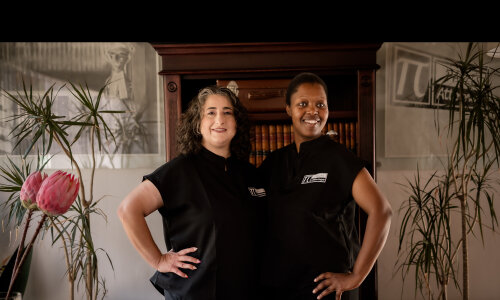Best Collaborative Law Lawyers in Benoni
Share your needs with us, get contacted by law firms.
Free. Takes 2 min.
Free Guide to Hiring a Family Lawyer
List of the best lawyers in Benoni, South Africa
About Collaborative Law in Benoni, South Africa
Collaborative Law is an alternative dispute resolution method that offers individuals and families a way to resolve legal matters outside of the courtroom. In Benoni, South Africa, collaborative law practices are most commonly used in family law disputes such as divorce, child custody, and property division. The process involves both parties and their respective lawyers working together in face-to-face meetings to reach a mutually acceptable agreement. Negotiations are guided by a commitment to transparency, fair dealing, and respect. Unlike traditional litigation, collaborative law aims to minimise conflict, reduce legal costs, and preserve relationships between parties whenever possible.
Why You May Need a Lawyer
Individuals in Benoni may require legal assistance with collaborative law for a range of reasons. Here are some situations where seeking a lawyer's help can be helpful:
- Divorce: When couples decide to end their marriage and prefer to resolve issues such as asset division and child support amicably.
- Child Custody and Support: When parents want to co-create parenting plans and financial arrangements in the best interest of their children.
- Spousal Maintenance: Determining fair maintenance agreements without going to court.
- Property Disputes: Negotiating property and financial settlements collaboratively.
- Family Business Arrangements: When family-owned businesses need structured agreements for continuity after significant life changes.
- Preserving Relationships: When parties want to maintain a cooperative relationship, especially for co-parenting or ongoing family interaction.
A qualified collaborative law lawyer ensures your interests are protected, helps manage negotiations, and guides you through the legal implications of any agreement.
Local Laws Overview
In South Africa, family law and dispute resolution are governed primarily by the South African Constitution, the Divorce Act 70 of 1979, and the Children’s Act 38 of 2005. While collaborative law is not yet codified as a separate legal process in legislation, it is practiced by lawyers authorized and trained in alternative dispute resolution. Agreements reached via collaborative law must comply with local laws and can be made an order of court, giving them legal enforceability. The process is confidential and parties must enter into a participation agreement committing not to use the threat of litigation during negotiations. Participating lawyers must withdraw from the matter if the process breaks down and the matter proceeds to court, ensuring that everyone remains fully engaged in a constructive process. Collaborative law is particularly relevant in Benoni due to its diverse population and evolving family structures, where personalized solutions and harmony are valued.
Frequently Asked Questions
What is collaborative law?
Collaborative law is a dispute resolution process where parties resolve legal issues together with their lawyers outside of court, focusing on cooperation rather than confrontation.
How is collaborative law different from mediation?
In mediation, a neutral third party (mediator) helps guide negotiations, but does not advocate for either side. In collaborative law, each party has their own lawyer, and all work together directly to resolve issues.
What types of cases are suitable for collaborative law in Benoni?
Collaborative law is most commonly used for divorce, child custody, maintenance, and property settlement matters, but can be applied in other civil disputes as well.
Do collaborative law agreements have legal standing?
Yes, if both parties agree, the settlement reached can be made an order of the court, making it legally binding and enforceable.
What happens if we cannot reach agreement?
If no agreement is reached, participating lawyers are required to withdraw from the case, and the parties are free to pursue litigation with new legal representatives.
Is collaborative law less expensive than going to court?
Generally, collaborative law is more cost-effective than litigation, as it typically resolves matters faster and with less animosity, leading to reduced legal fees.
Is the collaborative law process confidential?
Yes, discussions and disclosures made during the collaborative process are confidential and cannot be used as evidence in subsequent court proceedings.
Can we use collaborative law if children are involved?
Absolutely. Collaborative law allows parents to prioritize the needs and welfare of their children in a respectful and solution-oriented environment.
Do both parties need to agree to collaborative law?
Yes, collaborative law requires the informed consent and commitment of both parties to participate and negotiate in good faith.
How do I find a collaborative law lawyer in Benoni?
You should look for lawyers who are specifically trained in collaborative law and have experience in family or civil disputes in Benoni or the wider Gauteng region.
Additional Resources
When seeking additional support or information, the following resources may be helpful:
- South African Association of Collaborative Professionals (SAACP) - Offers information and a directory of accredited collaborative law practitioners.
- Benoni Magistrate’s Court - For information on making agreements court orders or general family law inquiries.
- Law Society of South Africa - Provides guidance on finding a qualified family law attorney with collaborative law experience.
- The Department of Justice and Constitutional Development - Resources on family law processes and child protection services.
- South African Medico Legal Association - May provide referrals for collaborative law practitioners in family disputes involving medical issues.
Next Steps
If you believe collaborative law may be the right approach for your situation in Benoni, it is recommended to:
- Consult with a legal professional specializing in collaborative law to assess your needs and options.
- Discuss the possibility of collaborative law with the other party involved to ensure mutual interest in the process.
- Request a formal participation agreement outlining the principles and rules of the collaborative law process.
- Attend scheduled meetings prepared to negotiate openly and cooperatively, with your lawyer's guidance to protect your legal interests.
- Bring all relevant documentation and be honest and transparent throughout the process.
- If an agreement is reached, proceed with having it reviewed and made an order of the court to ensure it is enforceable.
Collaborative law can be a constructive and cost-effective way to resolve legal matters in Benoni, focusing on cooperation and sustainable solutions. Always speak to a qualified legal professional to ensure your rights are protected and any settlement is fair and lawful.
Lawzana helps you find the best lawyers and law firms in Benoni through a curated and pre-screened list of qualified legal professionals. Our platform offers rankings and detailed profiles of attorneys and law firms, allowing you to compare based on practice areas, including Collaborative Law, experience, and client feedback.
Each profile includes a description of the firm's areas of practice, client reviews, team members and partners, year of establishment, spoken languages, office locations, contact information, social media presence, and any published articles or resources. Most firms on our platform speak English and are experienced in both local and international legal matters.
Get a quote from top-rated law firms in Benoni, South Africa — quickly, securely, and without unnecessary hassle.
Disclaimer:
The information provided on this page is for general informational purposes only and does not constitute legal advice. While we strive to ensure the accuracy and relevance of the content, legal information may change over time, and interpretations of the law can vary. You should always consult with a qualified legal professional for advice specific to your situation.
We disclaim all liability for actions taken or not taken based on the content of this page. If you believe any information is incorrect or outdated, please contact us, and we will review and update it where appropriate.













